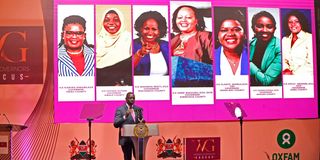How Ruto's latest appointments betray his gender rule promise

President William Ruto during the launch of the G7 women governors strategy at Safari Park Hotel, Nairobi on March 7, 2024.
What you need to know:
- President William Ruto has nominated men to replace three female chairpersons at key independent commissions (IPOA, SRC and CAJ).
- This is despite his previous promises to ensure gender balance in state appointments.
- The move has drawn criticism from gender advocates who say it contradicts his commitment to fulfill the two-thirds gender rule.
President William Ruto has once again failed to honor a promise of ensuring his administration fulfills the two-thirds gender rule. This follows his replacement of three female chairpersons of independent commissions with men.
In his latest appointment, the Head of State nominated former Independent Electoral and Boundaries Commission (IEBC) chairperson Ahmed Issack Hassan as chairperson of the Independent Policing Oversight Authority (Ipoa) board.
If approved by Parliament, Hassan will replace Anne Makori, who has served since 2018. He will lead a seven-member board comprising Ms Ann Wanjiku Mwangi, Mr Micah Onyiego Nyakego, Mr Boniface Kipkemoi Samati, Ms Annette Mbogoh, Mr John Muchiri Nyaga, Mr Ken Williams Nyakomitah, and Ms Jackline Lukalo Mwenesi.
President Ruto also nominated Sammy Chepkwony as Salaries and Remuneration Commission (SRC) chairperson to replace Ms Lynn Mengich, whose six-year tenure ended in September.
He further nominated Charles Orinda Dulo as Commission on Administrative Justice (CAJ) chairperson to replace Florence Kajuju, who served as the second Ombudsman of the Republic of Kenya from August 2, 2018.
Head of Public Service and Chief of Staff Felix Koskei said in a Tuesday notice that the nominations followed recommendations from respective selection panels to fill vacant positions. The appointments, however, contradict Ruto's promises to women during the 2022 campaign and subsequent meetings with women leaders.
During campaigning, the President promised his administration would appoint women to state offices once he assumed power to realise the two-thirds gender rule.
In March this year, the president announced that the ruling United Democratic Alliance would have a female running mate in the next election.
He reaffirmed support for women during this year's International Women's Day celebrations in Embu County, reiterating his administration's commitment to include women in national development. He emphasised the need to support women and promote equality in various roles.
President Ruto, however, appears to be falling short. He recently replaced former deputy Rigathi Gachagua with Prof Kithure Kindiki when some gender advocates had hoped he would select a woman.
In the latest government agency leadership changes where women were replaced by men, gender advocates believe the president did women a disservice.
Lake Region Community Development (Larcod) Director Hellen Oromo says appointing women to state offices has often been misinterpreted as favouring the female gender.
She notes this shouldn't be the case, explaining that women can lead just like men.
"The president should be considerate because women feel they do not have space in government. I am a human rights defender with special interest in women and this is what we have been fighting for," Ms Oromo adds.
According to the gender advocate, the president should have appointed women to positions previously held by women.
She suggests upcoming positions should go to women to build confidence among Kenyans that the government recognises women's role in the country.
Mr Julius Omuga, a member of the Gender Sector Working Group in Homa Bay County, also questions Tuesday's appointments, saying President Ruto is denying women leadership opportunities.
"He has also failed to consider persons with disability yet the group should be represented in government appointments," he says.
According to Omuga, the Head of State is defying the Constitution he swore to uphold. The gender advocate says the president should fulfil the constitutional requirement of two-thirds gender representation.
President Ruto's gender advisor Harriette Chiggai, however, believes the head of State remains committed to appointing women to leadership positions. She defends her boss, saying appointments balance required spaces and skills. Chiggai notes that women hold other positions in government parastatals. She adds that some positions previously held by men are now occupied by women.
"Even as we look for more women positions, we cannot use the negative argument as it deflates the more spaces we wish to get. We hope more women will get bigger offices and on merit in upcoming positions," Chiggai says.
President Ruto promised to ensure the two-thirds gender rule's realisation. His original plan was implementation within his presidency's first 90 days, saying, "Women don't have to wait for long," but this remains unfulfilled two years post-election.
Currently, various groups advocate for more women in Parliament and other leadership positions. Female governors under the G7 umbrella body are pushing for 14 female governors in the 2027 election.
Ruto also promised in September 2022, that women would constitute half his Cabinet to bridge gender inequality. The President's official website lists 25 members, including himself and his deputy.
Eight are women. They are CSs Alice Wahome (Lands and Public Works), Rebecca Miano (Tourism and Wildlife), Soipan Tuya (Defence), Dr Deborah Barasa (Health), Dr Margaret Ndung'u (Information and Digital Economy) and Beatrice Moe (East Africa Community). Other female cabinet members are Dorcas Agik Oduor (Attorney-General) and Mercy Wanjau (Secretary to the Cabinet).




